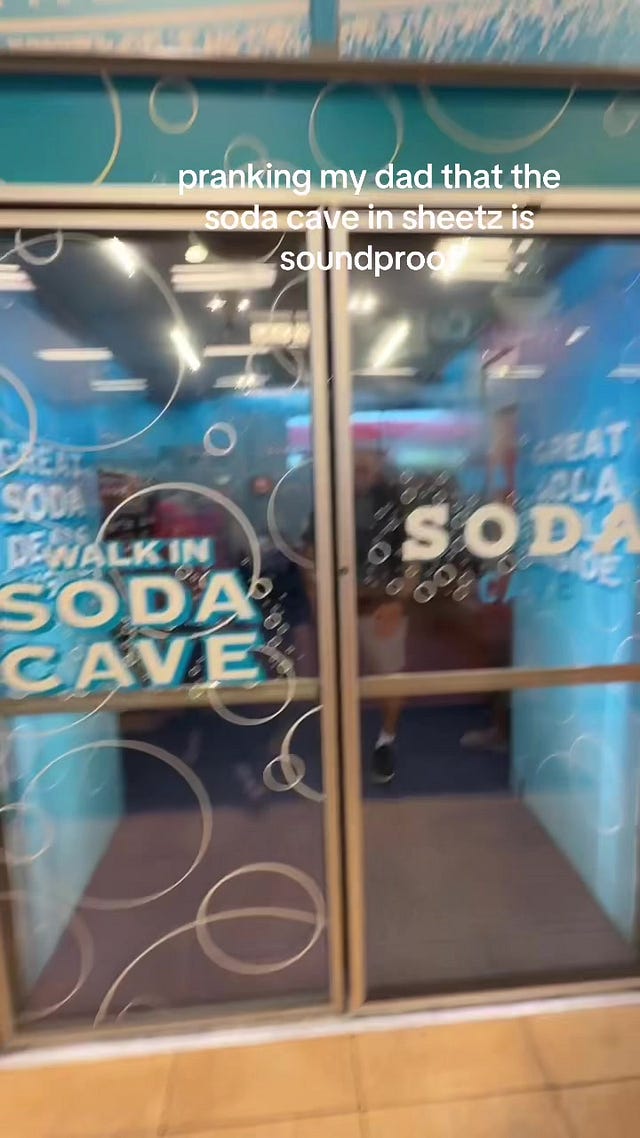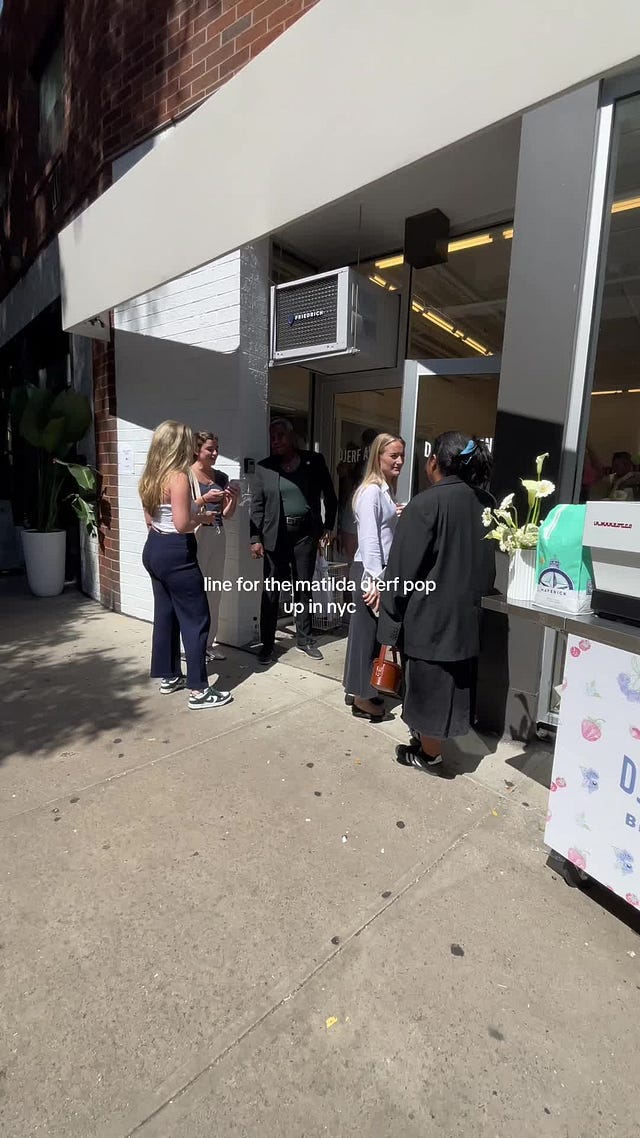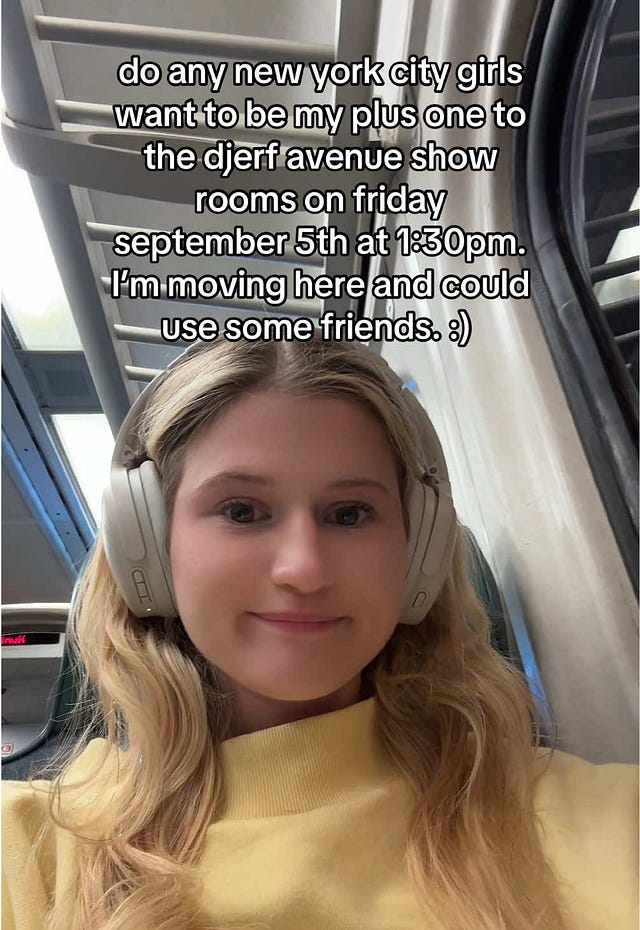Accessory-ception and Job Hugging
plus: an interview with Matilda Djerf
Welcome back to After School Monday Edition, a not-so-brief trends debrief for paid subscribers. 🫶
In today’s letter:
An interview with influencer-turned-entrepreneur Matilda Djerf
Vera Bradley’s charmingly millennialcore social campaign
One very brilliant “performative man” ad
The kids are wearing ponchos (I’m scared)
The return of skate shoes
Bump-Its and Book It, oh my!
Cracker Barrel tries, fails to win over Gen Z with rebrand and Meatpacking pop-up
AI engineers are Gen Z’s most eligible bachelors
“Shrekking” and “monkey-barring” are two new dating trends (what even are words anymore?)
And so much more, plus everything I’m buying, reading, and listening to. But first, my favorite TikTok of the week:
 Tiktok failed to load.
Tiktok failed to load.Enable 3rd party cookies or use another browser
Over the last few years, the line between “creator” and “entrepreneur” has all but disappeared. Chelsea Parke launched the ubiquitous (among a certain kind of girl) sweatshirt brand Parke, Paige Lorenz turned her Connecticut lifestyle into a lifestyle label called Dairy Boy, and Danielle Bernstein’s blog-turned-brand WeWoreWhat is sold (and routinely sells out) at Revolve and Shopbop.
But one of the most compelling influencer-slash-founders is Matilda Djerf, the now-28-year-old from Sweden who became a global fashion phenomenon seemingly overnight.

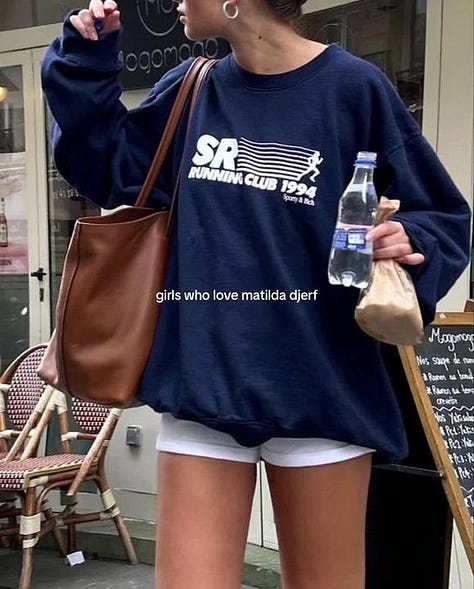
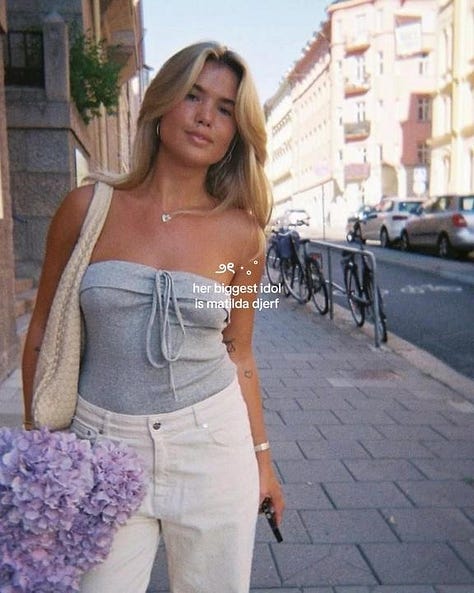
The story goes that in 2016, while traveling in the Caribbean with her now-fiancé Rasmus Johansson, Matilda began sharing her life on Instagram. Her audience grew quickly, and by 2018, she was a full-time influencer. Her Instagram following had swelled into the hundreds of thousands, mostly young women drawn to her effortless Scandi aesthetic. Even her hair — big, bouncy, blonde — became an internet sensation of its own, with over 13.8 billion views under “Matilda Djerf hair.” The Cut described it as “famous, internet-shattering, [and] vigorously emulated.”

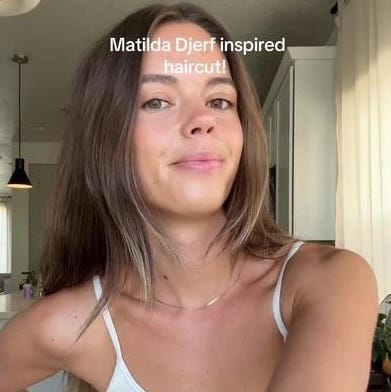
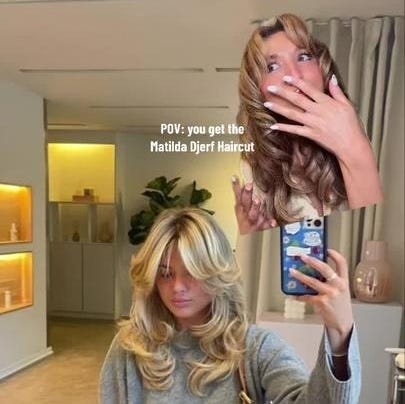

Matilda and Rasmus founded Djerf Avenue in 2019 without even bothering with a business plan. The debut collection, drawn heavily from her personal style, sold out overnight. The company, as Forbes reported, “went from zero to $35 million in revenue in just four years.” Her rise has been impossible to ignore; every time she hosts a pop-up, my social media feeds become flooded with content filmed by exuberant Matilda fangirls who line up for hours to catch glimpses of her and hang out with like-minded young women.
 Tiktok failed to load.
Tiktok failed to load.Enable 3rd party cookies or use another browser
Last year, just a few days after releasing a buzzy collaboration with Hailey Bieber’s beauty brand Rhode, anonymous reports surfaced, alleging a toxic work environment filled with favoritism. Matilda apologized publicly, admitting that she hadn’t been prepared to lead a growing company. The internet turned against her, as it is wont to do, but like any zoomer who came of age with an iPhone in hand, Matilda posted through it. (She also, it should be noted, enlisted the help of senior leadership, including the appointment of an interim CEO.)
The persistence paid off: Djerf Avenue ended 2024 with total sales reaching $36 million across 103 countries. The loungewear category, in particular, saw 83% sales growth last year. Her fanbase remains extremely loyal — 43% of purchases in 2025 are from returning shoppers.
On September 4th, Matilda returns to New York for a new kind of pop-up. She’s taking over an entire West Village townhouse, something she’s always dreamed about doing. There will be custom Djerf bagels created with Leon’s Bagels, iced coffee in partnership with Swedish bakery Fabrique, exclusive Rufus bag charms modeled after Matilda's own dog, and, almost certainly, hordes of young women angling for a glance at Matilda herself.
The townhouse will be available by appointment only, and 95% of the spots were filled within three days. (Some of those spots were reserved for young women from the Lower East Side Girls Club, where Matilda is a mentor.) Within just 48 hours, more than 2,000 fans applied to attend a special sleepover-inspired community event, complete with DIY journal decorating, nostalgic movie screenings, and a dance floor.
 Tiktok failed to load.
Tiktok failed to load.Enable 3rd party cookies or use another browser
I’ve long been fascinated by Matilda’s rise — the pop-ups, the controversies, the fandom, the hair. So when her team got in touch ahead of her latest pop-up, I jumped at the chance to talk to her. Below, our conversation:
Q: Your personal style — not to mention your signature fluffy blowout — has generated billions of views online. How does it feel to have something so personal turn into a cultural trend?
A: My genuine and honest answer is I don’t often think about it too much. I think that’s also a way of distancing yourself from it. But at the same time, I get to do what I love because of my community. It’s also the community that is helping drive trends and drive what social media wants to see.
Q: With the “Matilda aesthetic” being such a defining trend, how do you think about your own “aesthetic” shifting? Does your audience influence your style, or do you just follow your gut?
A: The older I get, the more comfortable I get within my own skin and my own choices. When I was younger, it was easier to get influenced by, “Okay, I wore this dress and everybody loved it, maybe I should wear something similar.” But today I’m very much, “I wear what makes me feel good.”
When it comes to designing for Djerf Avenue, we talk about our little triangle. At the top are the very true-to-Matilda items that I’m very particular about — these are my pieces. Then we have more commercial pieces, and then ones for a wider customer. It’s about finding balance and celebrating that our customers are going through life chapters alongside me.
Q: Do you see yourself more as a creative, a creator, or a businesswoman?
A: I definitely see myself as a businesswoman. Even when I was mainly working in social media, I saw it as my business. I was very particular with which brands I worked with: did we share values? Could I get the best deal? From the moment I started sending invoices, I saw myself as a businesswoman. But I’m also a very creative businesswoman. My strength is creativity, and I’m really good at problem-solving in creative ways.
Q: Gen Z has a complicated relationship with the term girlboss. Do you identify with it?
A: I’ve always just seen myself as a founder. I’m a boss, I’m a woman — but for me, I hope I can inspire other young people to go after their dream and do something that feels a little bit impossible, with or without education, with or without experience. The worst thing that can happen is it doesn’t work out.
Q: What have you learned about leadership that you’d pass on to aspiring young entrepreneurs?
A: The first thing I’d say is you don’t need to have it all figured out before you start. Djerf Avenue was born from my desire to create fashion that celebrates every body and to grow something hand-in-hand with the community that has been there from the start.
I didn’t have a traditional business background, but I had a clear vision for what I wanted Djerf Avenue to stand for, and that gave me the confidence to take the leap. I'd encourage women to trust their instincts and lean into their own vision, even when others don’t fully understand it. There will always be challenges, but staying true to your values and surrounding yourself with a strong support system makes all the difference.
And give yourself permission to evolve. Entrepreneurship isn’t about being perfect, it’s about being willing to adapt, learn, and grow with your business. Setbacks are part of the journey, but they can also shape you into a stronger leader if you let them.
Q: Being online is exhausting. How do you balance visibility with mental health?
A: Regardless of whether you’re online or not, it’s important to focus on yourself and your team. Their feelings and thoughts are what matter. The world is constantly changing, so you need a solid foundation to handle challenges. For me, social media is essential. I want to be in the DMs, connecting with my community — that’s always been sacred to me. If you run a business for Gen Z, you have to be online.
Q: Do you ever disconnect?
A: I’ve never taken a week completely disconnected. Photography has always been something I love, so I’m always taking photos. Now I might save them and upload later. But I’ve never truly gone offline. For me, being in the DMs is too important.
Q: Two aesthetics you’ve helped spearhead are “corp core” and “aesthetically pleasing bedrot.” What do you see coming next?
A: I’ve never really been one to look at trends. I just do what makes me feel good. I hope trends move toward more longevity, because the world would benefit from styles with a longer life. And I’m not leaving my oversized blazer behind — it’s a classic.
Q: What excites you most about the next, say, five years for Djerf Avenue?
A: It’s only been six years, but it feels like we’ve just started. We didn’t begin with a business plan, so five years feels like a whole lifetime for us. What excites me most is continuing to evolve, listening to our customers, and exploring retail and in-person activations. There’s so much more we want to do.
WEEKLY TRENDS DEBRIEF
Methodology: All week, I log trends mentioned across publications and social media that I categorize by culture, beauty, and style. This section is long, so please click “view in a browser.”
CULTURE
“Kidult” culture is getting out of hand. The Cut reports that parents are now seemingly competing with their kids for toys like Labubu dolls and Pokémon cards, blurring generational boundaries. Many millennial parents — themselves raised on Troll dolls and Pogs — are now buying Labubus for $700 a month, justifying it as “healing their inner child.”

